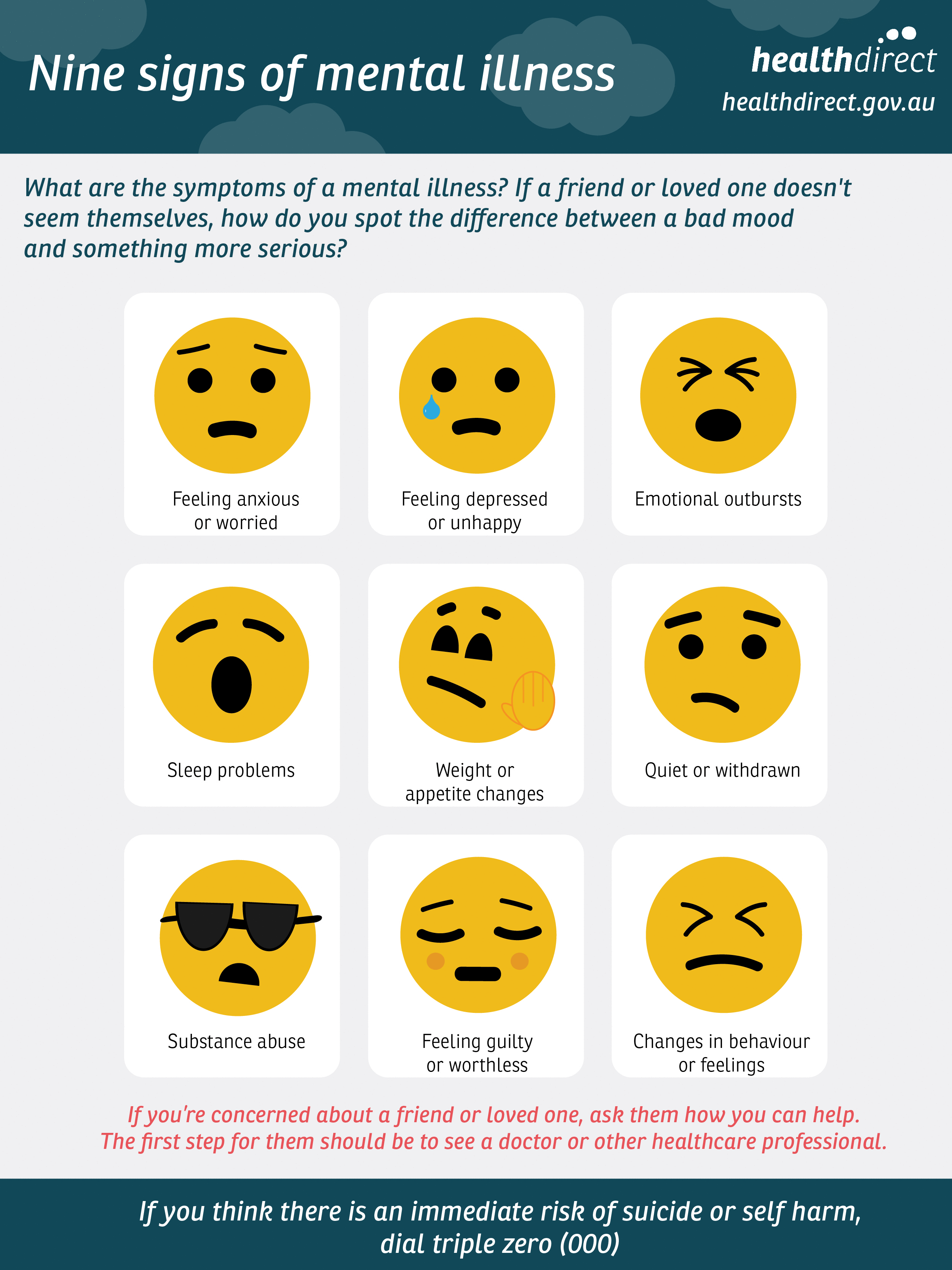Signs and symptoms of mental illness may include changes in mood, behavior, thoughts, and emotions. These changes can affect daily functioning and relationships.
Mental health conditions manifest in various ways, such as feeling sad or anxious, withdrawal from social activities, difficulty concentrating, changes in appetite and sleeping patterns, and experiencing intense mood swings. Identifying these signs and symptoms is crucial for early intervention and treatment.
Without proper recognition and support, mental illness can significantly impact an individual's quality of life. Understanding the signs and symptoms allows individuals, loved ones, and healthcare providers to offer the necessary support and seek appropriate mental health care.

Credit: www.healthdirect.gov.au
Understanding Mental Illness
Mental illness is a condition that affects a person's thinking, feeling, behavior, or mood. It can manifest in various ways and impact a person's ability to cope with day-to-day life. Understanding mental illness is crucial for promoting awareness and destigmatizing these conditions.
What Is Mental Illness?
Mental illness refers to a wide range of conditions that affect a person's mental health. It includes disorders such as depression, anxiety, bipolar disorder, schizophrenia, and many others. These conditions can cause significant distress and impact an individual's ability to function effectively.
Common Types Of Mental Illness
Mental illness encompasses a variety of disorders. Some common types include:
| Depression | Anxiety disorders | Bipolar disorder |
|---|---|---|
| Obsessive-compulsive disorder (OCD) | Post-traumatic stress disorder (PTSD) | Schizophrenia |
| Eating disorders | Personality disorders | Attention-deficit/hyperactivity disorder (ADHD) |
Prevalence Of Mental Illness
Mental illness is a global issue, affecting individuals of all ages, genders, and backgrounds. According to the World Health Organization, approximately 1 in 4 people will experience a mental health problem at some point in their lives. The prevalence of mental illness highlights the need for accessible mental health resources and support.

Credit: www.facebook.com
Recognizing Signs And Symptoms
Mental illness can be accompanied by various emotional symptoms. These can include persistent sadness, mood swings, extreme irritability, and feeling hopeless or empty. People suffering from mental illness may also experience anxiety, fear, or worry that impacts their daily life.
Cognitive symptoms of mental illness can affect a person's thinking, concentration, and memory. Such symptoms can include difficulty concentrating, confusion, forgetfulness, and indecision. Additionally, individuals may experience racing thoughts or persistent negative thoughts that interfere with their ability to function.
Behavioral symptoms can manifest differently in individuals with mental illness. They may exhibit changes in sleep patterns, excessive or reduced appetite, self-isolation, or aggressive behavior. Substance abuse or self-harm can also be indicators of mental health problems.
Mental illness can have physical manifestations as well. Some physical symptoms may include unexplained aches and pains, headaches, stomachaches, or digestive issues such as nausea or diarrhea. Fatigue and changes in sleep patterns may be present too.
The social symptoms of mental illness refer to how a person interacts with others. Social withdrawal, avoidance of social activities, struggling to maintain relationships, or difficulty in expressing emotions can all be signs of underlying mental health issues.
Seeking Help And Treatment
- Importance of Early Intervention: Early identification and intervention play a crucial role in managing mental health conditions. Recognizing the signs and symptoms early on can lead to effective treatment and improved outcomes.
- The Role of Healthcare Professionals: Trusted medical professionals, such as psychiatrists, psychologists, and therapists, can provide a comprehensive assessment and recommend suitable treatments.
- Effective Treatment Options: There are a range of effective treatment options available, including therapy, medication, and holistic approaches. Tailored treatment plans catered to individual needs can help in managing mental health.
- Support Systems and Resources: Having a strong support system is crucial for individuals battling mental illness. Friends, family, support groups, and helplines can provide the necessary emotional support and connect individuals to essential resources.

Credit: www.namigreenvillesc.org
Frequently Asked Questions On The Signs And Symptoms Of Mental Illness
What Are The Signs Of Mental Illness?
Signs of mental illness can include changes in mood, extreme emotions, withdrawal from social activities, difficulty concentrating, and changes in sleep patterns. It's important to seek help if you or someone you know is experiencing these symptoms.
How Is Mental Illness Diagnosed?
Mental illness is diagnosed through a series of assessments by mental health professionals. These assessments may include interviews, questionnaires, and observation of behavior. A comprehensive evaluation will help determine the presence and severity of a mental health condition.
What Are The Common Types Of Mental Illness?
Common types of mental illness include depression, anxiety disorders, bipolar disorder, schizophrenia, and eating disorders. Each condition has its own distinct symptoms and treatments. It's important to consult with a healthcare professional for an accurate diagnosis and appropriate treatment plan.
Can Mental Illness Be Treated?
Yes, mental illness can be treated. Treatment options may include therapy, medication, lifestyle changes, and support groups. It's important to work with a healthcare professional to develop an individualized treatment plan that addresses specific needs and goals.
Conclusion
Recognizing the signs and symptoms of mental illness is crucial for early intervention and support. By understanding the subtle changes in mood, behavior, and thinking patterns, individuals can seek the necessary professional help to improve their overall well-being. Remember, mental health should be treated with the same importance as physical health, and seeking help is a sign of strength.
Comments
Post a Comment